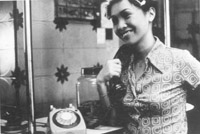Wri./Dir. Glen Goei
DOP: Brian Beheny Editor: Jane Moran (both Australian)
Starring Adrian Pang, Medaline Tan, Pierre Png, Anna Belle Francis
 Forever Fever follows a familiar formula seen before in so many American movies, but transposes the story onto late 1970s Singapore. I found myself laughing with all my heart, as the loud, exuberant culture of 90s Singapore finds a perfect dancing partner in the disco cliches and stereotypes of the 70s. While so many American films today are going retro and looking back at the seventies, they seem more interested in the drugs and the disco. Being set in Singapore, Forever Fever concentrates instead on the mainstream culture the story is set in; the fashion, the lovers and the dance. Moreover, slightly away from the American formula where the object desire is a hourglass blonde, the object of desire here is a motorbike. The chick comes second.
Forever Fever follows a familiar formula seen before in so many American movies, but transposes the story onto late 1970s Singapore. I found myself laughing with all my heart, as the loud, exuberant culture of 90s Singapore finds a perfect dancing partner in the disco cliches and stereotypes of the 70s. While so many American films today are going retro and looking back at the seventies, they seem more interested in the drugs and the disco. Being set in Singapore, Forever Fever concentrates instead on the mainstream culture the story is set in; the fashion, the lovers and the dance. Moreover, slightly away from the American formula where the object desire is a hourglass blonde, the object of desire here is a motorbike. The chick comes second.
I can relate better to this seventies film than to American seventies film, because I have seen photos of my (chinese) parents, uncles and aunties, wearing the clothes and hairstyles these Singaporeans wore back in the seventies, and I have browsed through their records collection to find Kung Fu Fighting and BeeGees disco among others. Like these Singaporeans, my elders also got the disco fever, and became slick-haired hybrids of Asian and Western culture.
The film bravely uses the mishmash of Hokkien and English spoken in Singapore, and there were no subtitles for the Orientally-challenged audience. The film forces the western audience to adapt to the Singlish, which for me, made this film quite shiok (good time, cool, excellent, a great surprise) lah. Although the story has been told many times, it is refreshing to watch this comedy because of its cultural displacement, and the cultural contexts explored; how Ah Hock has always wanted to have a motorbike (because he used to live in a kampong and had to walk miles to school), his brother has to face the reality of coming out to their homophobic parents, his prepubescent sister reads a Mills and Boon novel without understanding the meanings of the words ("koh, what does 'manhood' mean?"), 'dancing is for queers', Bruce Lee is God, and durian vacation is heaven. This is Singapore.
Following the formula, there is of course an absurdly happy ending. Ah Hock wins the disco contest, but instead of buying the motorcycle of his dreams, he donates the money to his brother for the sex-change operation. And he gets the girl, too! Haiya, so shiok, lah. The epilogue tells us that he finally gets his bike, too. Ah Hock said in the middle of the movie, "I'm so siong (unlucky) ah", but no, Ah Hock is so hokkie (lucky) indeed. With lots of laughs, Forever Fever entertains without straying from its south-east Asian heritage.
natalia laban
comments? email the author
read a review of the taiwanese movie The Hole
return to the 1999 Sydney Film Festival index